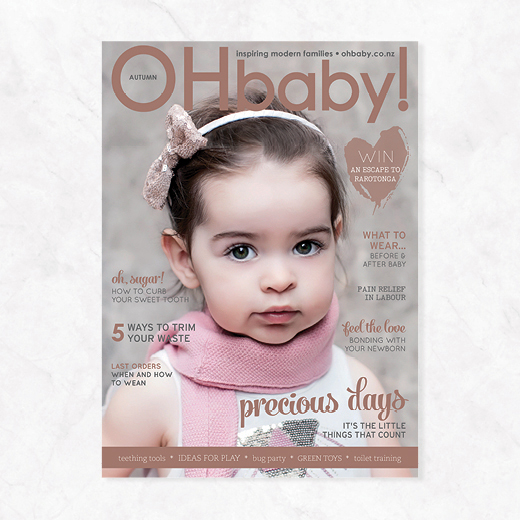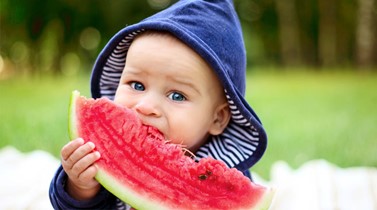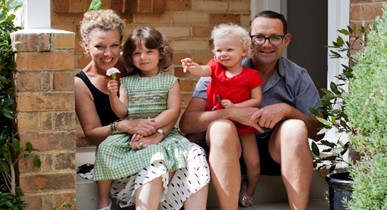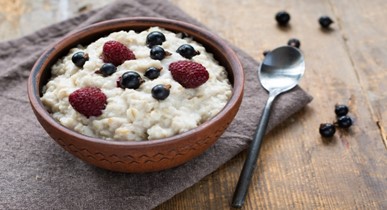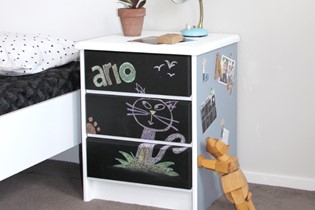Ways to REALLY connect with your baby

Even before birth baby’s senses are busy processing useful information. Sarah Tennant explains how touch, hearing, smell, sight and taste connect a baby to his family and the world around him.
So you've just had a baby and you've mastered the basics –feeding, running a bath, working a nappy... So far, so good. But for many mums – and perhaps the majority of dads – the question remains: in the times in between, what do you DO with your baby? After all, he can't talk yet, or smile; he can't play peek-a-boo or stack blocks or any of those stereotypical 'baby' activities. It's too early to indoctrinate baby into your favourite science fiction or sports fandom, but as a conscientious parent you’re still looking for ways to connect. But how?
In fact, there's a lot of teaching that simply happens though play and interaction with a baby – you just need to meet baby where he's at. And where a newborn is at is firmly in the realm of the senses. Touch, hearing, smell, sight, taste; once you understand what a baby can and can't do – or to put it another way, how much they can learn – filling up 'awake time' gets a whole lot more interesting.
Ten little fingers, ten little toes
Not everyone is naturally inclined to sing to their baby or dangle plush zebras eight inches in front of his eyes. But you'd be hard pressed to find someone who didn't instinctively touch her baby – hugging, kissing, sniffing, squooshing, nibbling at his toes. (The latter is a recognised scientific phenomenon known as 'cute aggression', incidentally; look it up.)
Babies are just huggable. And a good thing too, as touch is incredibly important – not only does it promote bonding, it assists with heat and sleep regulation, boosts his immune system and activates his growth hormones. (Preemies who are worn skin-to-skin in 'kangaroo care' actually grow faster than preemies in incubators.) Touch is possibly baby's most important sense.

A lot of baby's sensations in the first few weeks of life revolve around adjusting to a scary level of physical freedom. After the close and watery confines of the womb, a baby is suddenly exposed to vast, airy space in which physics seems to work quite differently. That's why many babies are comforted by swaddling; their limbs are once more securely snuggled up, unable to hit them in the face or kick out into endless nothingness. Many babies also enjoy bathing and swimming because being in water feels like their natural habitat – their limbs obey them again! (Think about how you'd feel adjusting to moving around in zero-gravity; being 'on land' is that weird for a baby.)
Gradually, of course, a baby learns where his limbs end and how to move them reliably. Baby massage is a wonderful tool for helping with this: it teaches baby where his 'edges' are. Infant massage also helps strengthen baby's muscle tone, promotes sleep and improves immune function.
Two little ears
Everyone with a newborn and a doorbell knows that babies hear just fine. They should; they've been hearing for months, albeit in a distorted, watery kind of way within the womb. At birth they already know their mother's voice, have an innate sense of rhythm, recognise often-heard pieces of music and can distinguish between their native language and a foreign one by the cadence of the vowels. Not too shabby!
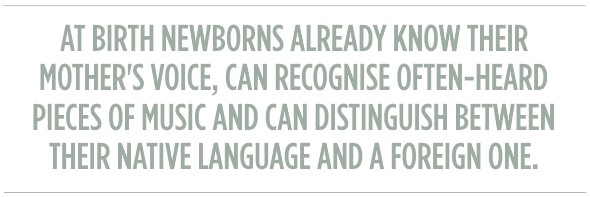
And a good thing too, because hearing –and in particular, exposure to lots and lots of language – is immensely important in a baby's learning. (That's why New Zealand has newborn hearing screenings – the earlier a deficit is caught, the better.)
Fortunately, mothers and medium-sized children at any rate tend to naturally talk to their babies, and in the high-pitched, exaggerated, repetitive 'baby talk' which is excellent for language-learning. In my experience, toddlers, teens and fathers are somewhat less likely to do this, out of either indifference or embarrassment. It's a shame, because the more words a baby hears, the better at language he'll be. And if baby talk isn't your thing, fine – read Shakespeare out loud, explain tort law, wax eloquent about the mould on the bathroom ceiling. Just talk.
And sing. I remember the first time we left our five-month-old daughter with baby-sitters, in order to indulge in the guilty, hasty pleasure of a wedding-anniversary lunch out. Said baby-sitters were my sister and her boyfriend. Long story short, Rowan started screaming; my sister slung her up on her shoulder and began singing; Rowan stopped screaming. The boyfriend, who hadn't met many real-life babies, was amazed. He thought singing to calm babies down was just something out of the movies; he was astonished that it actually worked!
But it does – not infallibly, of course, but often enough that it's worth a try when faced with a squalling baby. Better yet, try a bit of Pavlovian experimentation by using a different song for various activities – a bath song, a nappy-changing song, a going-to-sleep-now song. Babies often find it calming, and you might find them getting excited (or sleepy) as they realise what's about to happen.
And a tip for screaming babies? If you binge-watched a certain TV show while pregnant, play the theme tune and see if it calms the baby down. With Rowan, it was the Star Trek: Deep Space Nine theme, and it worked. (Unfortunately we've been watching The X-Files this pregnancy, and there's no way I'm playing that music in the middle of a cold, dark night.)
One little nose
Babies are perhaps better known as producers rather than connoisseurs of smell. Nevertheless, smell is one of a baby's most impressive senses.
In the early days babies are strongly attracted to and comforted by the smell of their mothers' amniotic fluid – which isn't terribly useful information, sadly, unless you happened to save a vial of the stuff.
Fortunately, baby's sense of smell quickly fixates instead on his mother's breast milk and sweat. It's thought that it is the smell of sweat as much as the milk itself that helps a baby navigate to the nipple.
It doesn't take long before a baby learns to prefer the smell of his own mother to the smell of anyone else's. This fact is now being exploited in some NICUs to comfort preemies whose mothers can't be present all the time. Mothers wear 'odor cloths' or 'scent dolls' next to their skin for a few days; when the fabric is thoroughly impregnated with their scent, the cloths or dolls are put inside the babies' incubators.
At home, you can perform a similar cheat to get your baby accustomed to a new person or sleeping place. An old nightie or sweatshirt of Mum's, tucked beneath the sheet or worn by the visitor, can lull a baby into calmness.
Of course, when the baby's going to be around strange-smelling people frequently – Dad, for instance – it makes sense to get him accustomed to their scents as soon as possible with early and frequent hugging, especially skin-to-skin.
Two little eyes that shine so bright
I don’t mean to be harsh, but sight isn't a baby's greatest ability. Even though babies do open their eyes in the womb, there isn't much of a view; so their eyesight gets a lot less stimulation than their other senses before birth. A newborn is extremely near-sighted and can only see fuzzily in black and white, when he thinks to open his eyes at all! He's also inclined to go cross-eyed from time to time, as the muscles around his eyes haven't strengthened yet.
Because of this poor eyesight, many toys and furnishings ostensibly purchased for newborns are useless. Pretty pastel-coloured soft toys will look indistiguishably grey to him; mobiles hung high above the crib will be too far away to see.

Instead, baby will get more satisfaction from looking at high-contrast items, particularly with strong patterns (think a black-and-white checkerboard). Better yet, he loves faces. His newborn point of focus – 20-30 centimetres – is the perfect distance for gazing into the face of the person holding or breastfeeding him. You can fascinate him by moving your head slowly from side to side, encouraging him to track your movements.
A baby's interest in faces also makes it worthwhile to 'read' him the family photo album, hold him up to talk to the grandparents on Skype, or pop him in front of a mirror. It'll be a long time before he recognises the baby in the mirror is himself, but hey, it's still a face.
You can even play mimicking games with a very new baby. Poke your tongue out at a baby, and he'll copy you. You might find the baby's older siblings are particularly keen on this game!
One little mouth to kiss good night
Taste might seem like a no-brainer – it's pretty much breast milk or formula, right? (Though I did know a baby who got his first taste of solids at six weeks thanks to a generous older brother. It was raw onion. He wasn't a fan.)
Well, formula is indeed the same meal every time, but breast milk comes in a wide variety of flavours – many of which the baby will already recognise from his time in the womb.
Before birth, the flavours his mother ate transferred to the baby via amniotic fluid; now, they transfer via breast milk. The concentration of flavours varies greatly from woman to woman and day-to-day – researchers have experimented by feeding women highly-flavoured pills and measuring the breast milk later. As you might expect, strong flavours like mint, garlic and liquorice 'cross' the breast milk particularly well.
In general, babies seem to like both the flavours and the variety. Studies have shown babies suckle longer at the breast when the milk tastes of garlic or vanilla, but the effect dissipates over time – like with anything, the novelty wears off after a few days.
There are a few points to take away from this. First, a nursing mother has the power to shape her child's food preferences in the long term. When babies start solids they prefer familiar food – so if Mum has never touched puréed liver in her life, chances are her baby won't like it either. But if you give baby a spoonful of something he's been tasting 'second-hand' for months, he's much more likely to accept it.
Formula also shapes babies' later preferences. Different formulations have different flavour profiles – sweeter, sourer, more bitter – and researchers have found a correlation between the formula flavour and the drink flavours the babies preferred later in life. (Why no-one has invented a broccoli-and-kale-flavoured formula yet is a mystery.)
Second, and more poetically: for a nursing mother, knowing a baby is tasting her cooking can transform her perception of the sometimes monotonous task of breastfeeding. Yet another night-feed isn't just another tummyful for the baby; it's a way of connecting him to his cultural heritage, priming him to think Mum (or Dad) is the best cook in the world later in life, and sharing the family's food preferences with him. They say you can't enjoy Marmite unless you've grown up with it so it's not too early to start patriotically priming your baby's tastebuds.
Sarah Tennant is a Hamilton-based freelance writer.

AS FEATURED IN ISSUE 29 OF OHbaby! MAGAZINE. CHECK OUT OTHER ARTICLES IN THIS ISSUE BELOW
